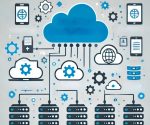Cloud technology in business — this is a revolutionary thing! It enables businesses to store, process, and manage data online rather than on local servers. They can work more intuitively, get information from anywhere and save costs. Cloud jobs are perfect for businesses of all sizes. The cloud technology is deployed across various industries. It also makes it paralleled with security, collaboration, and scalability. Today we will talk about trending cloud technology, the great benefits of the cloud technology, and how different corporations are using the cloud for slow growth and progress.
What is Cloud Technology?
Cloud technology provides computing services over the Internet, including storage, databases, networking, and software. What they do is that instead of having to use physical hardware, businesses are now using IT technology infrastructure to run applications and store data with the help of cloud technology. It enables organizations to scale operations effortlessly and improves efficiency while cutting hardware expenses.
How Cloud Technology is Special?
- Access Anytime and Anywhere : Organizations can access the resources anytime and anywhere.
- Scalability: Companies can increase or decrease their use according to the demand.
- Safety: Data protection and compliance controls are in place with cloud technology security through encryption.
- Cost-Efficiency: Companies only pay for what they use, saving costs.
- Automation: Many cloud technology solutions save time by automating tasks, reducing the need for manual work.
Cloud technology services are used by businesses of all sizes to perform better, be more flexible, and more efficient. It explains the most recent trends in Cloud technology and the future of the Cloud computing industry.
Trends in Cloud Technology
Companies constantly seek new ways to enhance efficiency and security. AI, Edge Computing, and Hybrid cloud models are being adopted by many businesses to gain a significant edge.
Key Cloud Technology Trends
- Cloud Data Science: Cloud solutions enable machine learning and AI, which allows organizations to automate processes and perform better analytics.
- Hybrid and Multi-Cloud Solutions: Firms combine public and private clouds for money-saving and secure computing solutions.
- Edge Computing: Businesses do processing closer to the users, reducing latency and increasing speed.
- Serverless Computing: Companies concentrate on developing applications without handling infrastructure.
- Sustainable cloud computing: Cloud tech firms invest in green data centers.
Future of Cloud Technology
Buoyed by the transition to remote work, which breeds a greater dependence on cloud technology, the outlook for cloud technology is very high. More businesses will move to cloud solutions to manage data, automate some processes, and secure them. Enterprises are securing cloud technologies to safeguard sensitive information. We will see the adoption of cloud technology in more and more domains like health care, education, or e-commerce.
How Businesses Are Using the Cloud?
Cloud technology is used by businesses to store data, run applications, and improve collaboration. It is efficient and cost-effective for companies and organizations.Business cloud technologies enable organizations to move from cost-intensive traditional IT and business systems.
| Feature | Cloud Technology | Traditional IT |
| Scalability | Easy to scale | Hard to expand |
| Cost | Pay for what you use | High upfront cost |
| Maintenance | Handled by providers | Requires in-house IT staff |
| Security | Advanced encryption | Needs manual updates |
| Collaboration | Remote access | Limited to office network |
Advantages of Cloud Technology for Business
Cloud technology is used by businesses to store data, run applications, and improve collaboration. The Advantages of cloud computing are listed below:-
- Cost Saving: Organizations don’t have to make any expensive initial investment in hardware, and they are only billed for what they consume.
- Better Collaboration: Cloud-based tools allow teams to collaborate from anywhere.
- Scalability: Organizations scale their storage and computing power as per requirements.
- Data security: Cloud technology has security measures protecting sensitive business information.
- Disaster Recovery: Cloud services give you backups so you don’t lose data.
Cloud Technology Use Across Industries
Generally, it is used by different industries as a solution to make the work faster and more innovative.
Cloud Technology in Health Sector
The cloud technology to manage the patient data. It offers high level of security, delay in fetching records and providing care to patient. Cloud solutions also form the backbone of telemedicine, AI-driven diagnostics, and medical research.
Cloud Technology in Finance
Real-time transactions, fraud detection, and secure data storage are also being employed by banks and financial institutions on the cloud. By using the cloud technology security you can also get rid of those types of cyber threats.
Cloud Technology in Retail
Cloud solutions help retailers manage inventory, process payments and analyze consumer data. Cloud technology is enabling businesses to gain better customer experiences by targeted marketing & online platforms.
Cloud Technology in Education
Educational institutions can use cloud technology services to partner with centralized application providers for online learning and automate student records archiving.
Pros and Cons of Cloud Technology
There are many advantages to cloud technology, but at the same time, the disadvantages must be examined from a business perspective.
Benefits Of Cloud Technology
- Decreased IT Expenses – Companies reduce the cost of hardware and upkeep.
- Flexibility: Companies can access the data from anywhere.
- Automatic Updates – The Cloud providers themselves manage software updates.
- Security Improvements – The security features of Cloud technology safeguard data against breaches.
- Enhanced Cooperation: Employees collaborate more effectively.
The Disadvantages of Cloud Technology
- Business Internet Dependencies — Companies rely on a good Internet.
- Security Threats: If badly managed, cloud data can be exposed to cyber-attacks.
- Limited Control: Companies depend on cloud technology companies for infrastructure management.
- Migration: Moving from traditional IT to the cloud may take time.
Relevance to ACCA Syllabus
Cloud tech directly bears upon financial reporting, audits and risk management — all key strands of the ACCA syllabus. It helps accountants handle financial data in real time, automates the reporting process, and is compliant with international materials. Therefore more than ever, accountants must be aware of the changes brought by digital transformation in the global financial market by using cloud-based accounting software and the cybersecurity of financial transactions, which is an important issue both in professional ethics and governance.
Cloud Technology ACCA Questions
Q1 What is one of the main advantages of cloud-based accounting software in financial reporting?
A)You may put restricted access to the financial documents
B) Update Finance, Data in real-time
C) No longer subject to compliance with financial regulations
D) Financial data in real time
Ans: D) Updation of Real-time financial data
Q2: What is ONE important risk in cloud computing that relates to financial management?
A) Reduced scalability
B) Growing cyber threats
Remove the need for auditing
D) Decreased cost efficiency
Ans: B) Rise in cyber attacks
Q3: What is why the audit is effective from Cloud computing?
A) By getting the audit out of the way
B) Giving auditors on-demand access to financial records
G) Hinging all trust on AI to do human auditors’ jobs
D) By making the state of financial transactions more complex
Ans: B) Auditors granted real-time access to financial records
Q4: What cloud model is most relevant to the usage of cloud financial software for accountants?
A) IaaS (Infrastructure as Service)
B) PaaS (Platform as a service)
C) Software as a Service (SaaS)
D) Equipment as a Service (EaaS)
Ans: C) Software as a Service (SaaS)
Q5: Cloud storage has a much better record than this on the practical aspects of the financial reporting process
A) In contravention of regulatory requirements
B) Restricted data flow
C) Enhanced safety and disaster recovery modes
D) An increase in manual data processing
Ans: C) Better data security and disaster recovery solutions
Relevance to US CMA Syllabus
Since it is relevant to the US CMA syllabus, cloud technology has an impact on cost management, budgeting, and financial planning. Cloud-based ERP is enterprise resource planning that is run in the cloud and facilitates real-time financial analysis, cost control, and better decision-making. This is further compounded by the fact that the use of cloudcomputing is essential in data analytics and automation, prerequisites for effective managerial decision making, as well as strategic management of finance.
Cloud Technology US CMA Questions.
Q1: How does cloud computing help a managerial accounting since it is a cost-cutting transaction?
A) By increasing fixed costs
B) By enabling real-time tracking of transactions
C) Reducing operational efficiency
D) Beautifying the budgeting process to be inflexible
Ans: B) To enable real-time monitoring of monetary transactions
Q2: Which function of cloud computing facilitates better financial planning and budgeting?
Q1: What do you know about financial and other types of data?
B) More manual data entry
D) Reduction of monetary papers
D) Reluctance of financial workforce
Ans: A) Automation of financial data analysis
Q3: What are the benefits of cloud service in terms of strategic cost management?
A) It saves (Accessing the financial statements)
Failure of analysing financial trends
C) It is useful for making economic decisions
D) It makes it harder to account for costs
Ans: C) It provides up-to-date information about finances to decision makers
Q4: These cloud-based financial management tools come with limitations. What is one of them?
A) Limited data storage
B) Less ability to monitor financial performance
C) Hackings and data breaches
D) Eliminating budgetary criteria
Ans: C) Hacking and data breaches
Q5 What are the benefits for management accountants in cloud-based ERP systems?
A) Denying access to financial data
B) Through the pursuit of financial reporting and prediction simplicity
C) By placing extra burdens on the cost accountants
D) By removing financial analytics from decision-making
Ans: B) At the time of financial reporting and forecasting
Relevance to US CPA Syllabus
The Syllabus of US CPA has a mention of cloud technology under the functions of audit, taxation, financial reporting, and internal controls. Cloud computing offers real-time access to data, better security control for tax reporting, and more efficient systems for financial data management, all of which are advantageous to auditors. As cloud-based accounting systems become common, CPAS must move beyond knowledge of data security, regulatory compliance, and risk management techniques.
Cloud Technology US CPA Questions
Q1: How does cloud computing affect the external audit?
A) Limiting auditor’s data access
B) Real-time financial data access
C) As it eliminates the need for compliance checks
D) Do more manual juggling of financials
Ans: B) Access to the real-time financial data.
Q2: What are the tax reporting risks associated with cloud-based accounting?
A) More often than not, tax computations are done manually
B) Enhanced data security
C) Financial data may potentially be accessed.
D) Simplified tax filing
Ans: C) Unauthorized access to sensitive financial data
Q3: What is the benefits of cloud computing for CPA professionals?
(A) Financial statement preparation time ‘short’
B) Most manual accounting practices
C) Less need for compliance
D) It would remove tax reporting obligations
Ans: A) Preparation of FS will be quicker
Q4: Within accounting regulations, transparency is a natural guarantee (cloud computing enables users to review utilized resources and benefit from pay-per-use_services provided).
A) Data encryption and access management.
B) Removal of audit trails
C) Loosening of security measures
D Pursue other financial disclosures
Ans: A) Data encryption and multi-layer access controls
Q5: How do cloud-based financial systems impact regulatory compliance?
Q) (A) Achieving automation of financial reporting and audit trail
B) Optional compliance requirements
C) via rules that are exempt from regulatory scrutiny
D) Add further limitations on financial disclosures
Ans: A) Process automation of financial reporting and audit trails
Relevance to CFA Syllabus
Cloud computing is another topic is a critical aspect of the finance domain and is important in core financial analysis concepts, portfolio management, and risk assessment, which are included in the CFA exam. Along with the evolution of price charts, cloud-based data analytics tools enable investment decision-makers with access to real-time financial insights, therefore improving the accuracy of their forecasts and risk modelling. It aids in the efficient management of the asset via secure data storage and analytics which in turn optimizes the overall functioning of the service providers.
Cloud Technology CFA Questions
Q1: Benefits of Cloud Computing for Investment Analysts.
A) Final Financial Projections
B) By providing real-time access to financial market data
C) By increasing reliance on manual calculations
D) Making it harder for effective portfolio-analysis
Ans: B) By offering real-time access to financial market data
Q2: How do cloud-based financial analytics benefit the investment management industry?
A) The market data feed is lagging
B) Current market research & portfolio titling
C) Lose access to investment analysis tools
D) Costlier access to data
Ans: B) Real-time risk assessment and portfolio adjustments
Q3: How Cloud Financial Tools Support Portfolio Managers
A) Increase the difficulty of data for investments
B) Automated risk assessment model delivery
C) By eliminating risk management strategies
D) Adding complexity to how to plug it into asset allocation
Ans: B) Automated risk assessment model
Q4: Identify a big cloud computing risk when conducting a financial modelling.
B) Increasing cybersecurity threats
B) Ability to store less data
C) Malabsence of market flow
D) Increased reliance on antiquated financial models
Ans: A) Rising cybersecurity threats
Q5: How does cloud-based processing improve financial forecasting?
A) Automated data analysis and scenario modelling
B) Blocking the necessary predictive analytics from the financial investing
C) Restricting access to financial reports
D) Because it makes historical data irrelevant in terms of predicting future trends
Ans: A) Automation of analysis of data and scenario modelling


